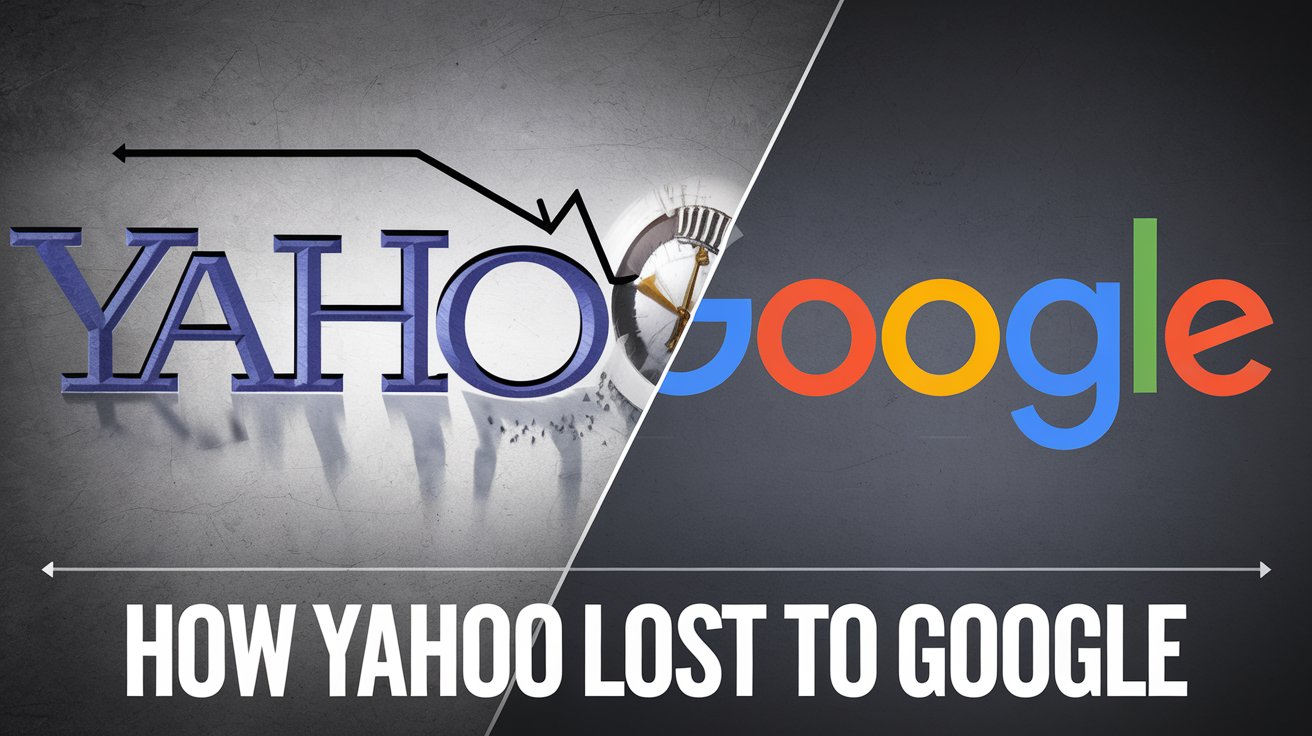In the early days of the internet, Yahoo was a dominant force. Founded in 1994 by Jerry Yang and David Filo, Yahoo quickly became the go-to web directory and search engine for millions of users. At its peak, Yahoo was one of the most valuable internet companies, boasting a vast array of services, including email, news, finance, and even a successful advertising platform. However, as the internet evolved, so did the competition. Enter Google—a new player with a revolutionary approach to search that would eventually dethrone Yahoo and redefine the internet landscape.
Today, Yahoo is a shadow of its former self, while Google stands as one of the most powerful and influential companies in the world. The story of how Yahoo lost to Google is a tale of missed opportunities, poor decision-making, and the failure to innovate. This blog explores the key factors that led to Yahoo’s downfall and how Google seized the moment to become the dominant force it is today.
The Rise of Yahoo: A Promising Start
Yahoo’s journey began as a simple web directory, created by two Stanford University students to help users navigate the rapidly growing internet. In its early years, Yahoo capitalized on the novelty of the web, offering a curated directory of websites categorized by topics. As the internet expanded, so did Yahoo’s ambitions. The company quickly added features like email, news, finance, and even online chat rooms, becoming a one-stop shop for internet users.
By the late 1990s, Yahoo was a giant. It went public in 1996, and its stock price soared during the dot-com boom. Yahoo’s advertising business was thriving, and the company made several high-profile acquisitions, including GeoCities and Broadcast.com, which further cemented its position as the leading internet portal.
However, while Yahoo was enjoying its success, a small startup was quietly working on a technology that would change the internet forever. That startup was Google.
Google’s Entry: A New Way to Search
Google was founded in 1998 by Larry Page and Sergey Brin, two Stanford University Ph.D. students. Unlike Yahoo, which relied on human editors to categorize and rank websites, Google introduced a revolutionary algorithm called PageRank. This algorithm analyzed the relationships between websites to determine their relevance and importance, allowing Google to deliver more accurate search results.
Google’s search engine quickly gained popularity due to its simplicity and effectiveness. Users appreciated the clean interface, fast results, and most importantly, the relevance of the search results. By focusing solely on search, Google was able to fine-tune its algorithm and deliver a superior product compared to Yahoo’s more cluttered and ad-heavy approach.
Despite Google’s early success, Yahoo had several opportunities to change the course of history. Unfortunately, a series of strategic missteps and missed opportunities would lead to its downfall.
Missed Opportunities: Yahoo’s Strategic Missteps
One of the most significant missed opportunities in Yahoo’s history came in 2002 when Yahoo had the chance to buy Google. Larry Page and Sergey Brin initially offered to sell Google to Yahoo for $1 billion. Yahoo, under the leadership of then-CEO Terry Semel, balked at the price and tried to negotiate the deal down to $900 million. Page and Brin refused, and the deal fell through. Today, Google is worth over $1 trillion, making this one of the most expensive missed opportunities in corporate history.
Another major misstep was Yahoo’s decision to outsource its search engine to third-party providers. In 2000, Yahoo began using Google’s search technology to power its own search results. While this move initially improved Yahoo’s search quality, it inadvertently handed Google more market share and visibility. As Google continued to grow, Yahoo became increasingly reliant on its competitor for search results, weakening its own position in the market.
Yahoo also struggled to innovate and adapt to changing market trends. While Google was rapidly expanding its offerings with products like Gmail, Google Maps, and YouTube, Yahoo was bogged down by internal bureaucracy and a lack of clear vision. The company made several misguided acquisitions, such as the $3.6 billion purchase of GeoCities, which failed to deliver the expected returns.
Perhaps most telling was Yahoo’s failure to capitalize on the growing importance of search advertising. Google introduced AdWords in 2000, a pay-per-click advertising platform that would become one of the most profitable business models in history. Yahoo, despite its vast user base, failed to develop a competitive advertising platform and was eventually left behind as Google dominated the online advertising market.
The Rise of Google: Innovation and Focus
While Yahoo was floundering, Google was laser-focused on innovation and improving its core product—search. Google’s founders believed that the future of the internet lay in the ability to organize the world’s information and make it universally accessible and useful. This mission drove the company to continuously refine its search algorithm, making it more accurate, faster, and more reliable than any other search engine.
Google’s commitment to innovation didn’t stop at search. The company began launching a series of groundbreaking products and services that would eventually become integral parts of users’ daily lives. Gmail, introduced in 2004, revolutionized email with its free, high-storage offering and powerful search features. Google Maps redefined online mapping, and YouTube, which Google acquired in 2006, became the world’s leading video-sharing platform.
In addition to its consumer-facing products, Google invested heavily in its advertising business. AdWords, and later AdSense, allowed Google to monetize its search engine and other services effectively. By offering targeted advertising based on users’ search queries and web behavior, Google created a powerful revenue stream that fueled its growth and expansion.
Google’s focus on innovation, coupled with its ability to monetize its services effectively, allowed the company to overtake Yahoo and become the dominant player in the internet space. By the mid-2000s, it was clear that Google had won the search engine war, and Yahoo was struggling to stay relevant.
Yahoo’s Decline: The Final Years
As Google soared, Yahoo entered a period of decline marked by leadership changes, failed strategies, and financial losses. The company went through a revolving door of CEOs, each with a different vision, but none able to reverse the downward trajectory. Yahoo tried to reinvent itself multiple times, shifting focus from search to media, but these efforts were too little, too late.
In 2008, Microsoft made an unsolicited offer to buy Yahoo for $44.6 billion, which Yahoo’s board rejected, believing the offer undervalued the company. However, Yahoo’s stock plummeted after the rejection, and the company never recovered its former value. Microsoft would later strike a deal with Yahoo to power its search engine with Bing, further reducing Yahoo’s influence in the search market.
Yahoo’s final years were marked by a series of high-profile data breaches, costly acquisitions that failed to deliver, and declining ad revenue. The company’s core internet business was eventually sold to Verizon in 2017 for a fraction of its peak value, marking the end of Yahoo as an independent company.
Lessons from Yahoo’s Fall
The story of Yahoo’s decline offers several important lessons for businesses and entrepreneurs:
- Innovation is Key: Yahoo’s failure to innovate and improve its core products allowed competitors like Google to overtake it. Continuous innovation is essential to staying relevant in a rapidly changing market.
- Focus on Core Strengths: While diversification can be beneficial, Yahoo’s lack of focus and clear strategy led to its downfall. In contrast, Google’s unwavering focus on search allowed it to build a robust foundation for future growth.
- Adapt to Market Changes: The internet landscape changed rapidly in the 2000s, and Yahoo failed to adapt. Companies must be agile and willing to pivot when market conditions change.
- Don’t Miss Strategic Opportunities: Yahoo’s decision not to buy Google in 2002 was a costly mistake. Recognizing and seizing strategic opportunities can be the difference between success and failure.
- User Experience Matters: Google’s emphasis on a clean, user-friendly interface and relevant search results won it loyal users. Yahoo, bogged down by ads and clutter, lost its appeal.
Conclusion: The Enduring Legacy of Yahoo’s Decline
Yahoo’s decline is a cautionary tale of how even the most successful companies can falter if they fail to innovate, focus, and adapt. While Yahoo still exists today in some form, it is a far cry from the internet giant it once was. Meanwhile, Google has become synonymous with search and continues to expand its influence across every corner of the digital world.
As businesses and entrepreneurs look to the future, the lessons from Yahoo’s fall serve as a reminder that success in the tech industry requires more than just a good idea—it demands continuous innovation, strategic focus, and the ability to adapt to a constantly changing landscape.





